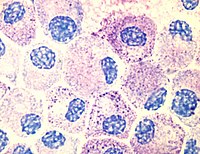
Photo from wikipedia
Mast cells are multifunctional immune cells that are found most abundantly at host-environment interfaces, such as the skin, respiratory tract, and oral/gastrointestinal mucosa. Not surprisingly, mast cells act as sentinel… Click to show full abstract
Mast cells are multifunctional immune cells that are found most abundantly at host-environment interfaces, such as the skin, respiratory tract, and oral/gastrointestinal mucosa. Not surprisingly, mast cells act as sentinel cells that sense microbial attacks and initiate a protective immune response and promote healing. Although mast cells share many features with other innate immune effector cells, such as neutrophils and macrophages, they uniquely interact closely with blood vessels and release an extensive set of mediators for the recruitment of innate and adaptive immune cells. A novel human G protein-coupled receptor (GPCR), known as Mas-related GPCR-X2 (MRGPRX2, mouse ortholog, MrgprB2), has recently been identified, which is expressed on mast cells but not neutrophils and macrophages. Interestingly, activation of MrgprB2 by bacteria-derived quorum-sensing peptides inhibits bacterial growth, prevents biofilm formation, and leads to the recruitment of neutrophils to effectively clear bacteria. Furthermore, host defense antimicrobial peptides and small-molecule peptide mimetics also activate mast cells via MRGPRX2/B2. MrgprB2-mediated activation of local mast cells also clears cutaneous bacterial infection, promotes healing, and protects against reinfection. In addition to their role in host defense, mast cells contribute to a number of chronic inflammatory diseases such as periodontitis, neurogenic inflammation, and inflammatory pain likely via the activation of MRGPRX2. In this review, we discuss the roles of MRGPRX2/B2 in the clearance of bacterial infection, wound healing, periodontal disease, neurogenic inflammation, and inflammatory pain. We propose that harnessing mast cells’ host defense and immunomodulatory properties via the activation of MRGPRX2 may lead to novel approaches for the treatment of drug-resistant bacterial infections. On the other hand, increased MRGPRX2 expression on mast cells and their inappropriate activation may contribute to periodontitis, neurogenic inflammation, and inflammatory pain. Thus, targeting MRGPRX2 could provide novel approaches to modulate these conditions.
Journal Title: Journal of Dental Research
Year Published: 2020
Link to full text (if available)
Share on Social Media: Sign Up to like & get
recommendations!